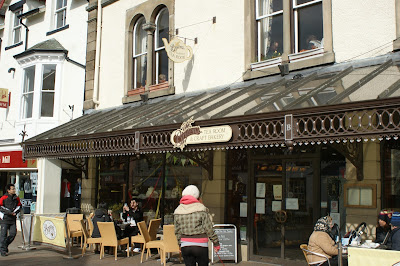 |
| Spiky bits on right are cathedral; flatter building on left is castle. |
Vivien and I spent a day wandering through the charity shops in Durham. It made a change from our usual haunts. I love going on the train for pleasure now that I don't have to get an 0600 train to London and return to Newcastle well wrung out at 2100 with still another half an hour to home, all my energy and my evening gone. Perhaps I should be grateful for those weary journeys because it was those days that truly brought home to me the real exchange I was having to make for my nice pay cheque. But thankfully that is all past, and in any case the train journey from Newcastle to Durham is all of 15 minutes...

I was keen to get photos of the cathedral and the castle (obviously mine aren't as good as these links I've given you). I knew from the many times I'd passed through Durham that the view from the station was good. The castle and the cathedral each rightly deserve their own post, to be fair. I got distracted in my last post because Durham castle now belongs to the University and serves as halls of residence to about 100 students. Tough life, eh?

Railway arches always impress me, they are at once so intimidating but also somehow graceful.
Vivien noticed this interesting old water fountain, just a niche in the wall by the arches.
Hard to imagine a time when everyone didn't have running water in their own homes.
 |
| The River Wear (rhymes with dear). |
We had a list of shops, most of which were on one main street, and then we wandered along to find lunch at what turned out to be a cozy pub beside the market place.

The market was amazing, too, sort of a series of tents within a building, all stuffed to the gills with merchandise.

A person would need neither department store nor internet very often with access to markets like this and the one in Newcastle. Some folks are sniffy about markets, though. Their loss.

 |
| View from the pub window, down onto the market! |
 |
| Loved this bookshelf wall paper! |
Probably the most fun place we found was Oxfam's 'Boutique', where the cream of the donations had obviously been collected. The prices reflected the special nature of the items, but sadly neither of us were in the market for anything we found. I think it would likely be aimed at the affluent students of the university.

We walked way up a hill to find a shop that probably never existed, but we figured the exercise was good for us and the street was full of lovely old Victorian houses that were a delight. You can see it yourself, just go to Google maps, ask for Albert Street Durham, put the little yellow man on the road and 'walk' along the street, up the hill. The pretty houses start with the ivy on the left... For that matter you could walk all around Durham should you wish. I love Google maps!
 |
| Left: Old Dun Cow Pub; Right: former Masonic Hall |
Vivien worked in Durham at one time and she took me up Old Elvet street towards the Durham prison and the court. It was a lovely green, peaceful place, but Durham prison has a reputation that is chilling, to say the least.
 |
| Durham courts. |
My general impression is that between Britain's welfare system and its somewhat permissive legal system, a person has to go a long way to land in prison, so the people there are a bit scary. Also, I'm thinking that prisons stand at the far end of the queue for public money and so conditions there are harder than most. By the end of a prison sentence, I reckon 'that which didn't kill you made you meaner'. In with the fear, I do have a bit of compassion. I've had glimpses of life at the bottom of the heap and can't say I'd make all the right decisions had I started there. I've had a relatively soft life and I know it.
One of the first buildings we passed was an enormous red brick building, far too large to even attempt a photo. It was a former County Hall for Durham, called the Old Shire Hall. It's not particularly old for the area, built in 1895, but it is listed as an historical building to be protected. It is for sale and will likely be turned into flats. Some people think this is sad, but I say better than to tear it down. Also, it might be a fun place to live!
Vivien pointed out these two remarkable buildings which, like the name of the Old Shire Hall, have taken me all morning to discover. Bill recognised the Old Dun Cow, but the building next to it is the old Masonic Hall. So far as I can tell it is no longer associated with the Masons (and of course I got distracted trying to figure out if women are allowed to join...I lost interest before I got to the bottom of it. I'll still with the craft groups for now).
 |
| Tiles on the Half Moon Pub |

 |
| From their website; doesn't capture the romance, somehow. |
Old Elvet is an amazing street and I'm thinking I'd like to take this article and walk back up it one day. (And of course, you can use Google maps and do the same...)








































